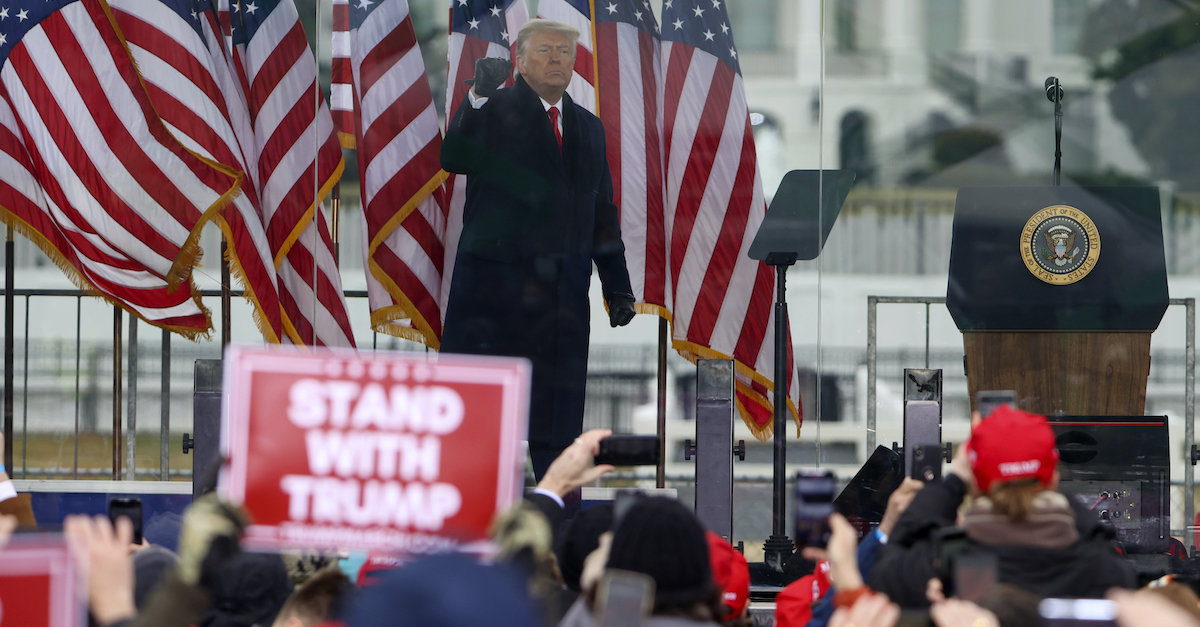
Former President Donald Trump delivers a speech at the Ellipse on Jan. 6, shortly before his mob of supporters ran riot inside the U.S. Capitol. (Photo by Tasos Katopodis/Getty Images)
A second federal judge has rejected Donald Trump’s claim of absolute immunity from civil liability in connection with the attack on the U.S. Capitol, giving advocacy groups another opportunity to hold the former president liable under the Voting Rights Act and the Ku Klux Klan Act.
In a subheading of his 23-page ruling, Senior U.S. District Judge Emmet Sullivan declared flatly on Monday: “Former President Trump is Not Absolutely Immune From Damages Liability.”
The judge, who previously dismissed other Jan. 6-related claims against Trump and the Republican National Committee, explained that presidents defending against actions for damages can typically invoke “absolute” privilege when the conduct at issue relates to official duties.
“However, immunity does not protect acts that former President Trump undertook outside the outer perimeter of his official duties,” Sullivan noted.
After the 2020 election, the Detroit-based Michigan Welfare Rights Organization sued Trump and the RNC under the Voting Rights Act and the KKK Act, a Reconstruction-era law initially designed to protect the rights of newly freed enslaved people from white supremacists. Together with the NAACP and three Black voters from Detroit, the group noted that Trump and the RNC directed their election-subversion efforts in places with large populations of color.
In April, Sullivan found that the groups lacked standing to bring a lawsuit seeking injunctive relief under the Voting Rights Act because they failed to show impending future injury. The judge, however, deferred a ruling on the KKK Act allegations and will give the plaintiffs another opportunity to revise their complaint to pass procedural muster. Trump claimed any attempt to sue him would be “futile” because he was supposedly acting in accordance with his official duties after the 2020 election, a proposition the judge rejected.
“Further, and as Plaintiffs assert, Former President Trump ‘does not even attempt to explain how intimidating and coercing election officials, or inciting intimidation and threats against election officials, could possibly constitute executive action in defense of the Constitution, particularly given that his actions targeted only officials in areas where he lost,'” the judge wrote, quoting the complaint. “Nor does he offer any reason to believe his efforts to expose ‘election fraud’ were part of any executive effort.”
Sullivan indicated that the advocacy groups could prove standing because Trump’s attempts to overturn the 2020 presidential election results remain “ongoing.” As recently as this past March, Trump pressured Wisconsin Assembly Speaker Robin Vos (R) to nullify the results in his state. Vos, who entertained Trump’s election conspiracy theories, refused because he noted he did not have that legal power.
The judge also noted that the fact that individual plaintiffs are Black voters who live in Michigan make them uniquely susceptible to Trump’s election-subversion efforts.
“The Court is also cognizant that the individual Plaintiffs are Black voters who are particularly targeted by Former President Trump’s baseless allegations of election fraud,” noted Sullivan, who is Black.
Turning to the RNC, Sullivan noted that its chairperson Ronna McDaniel described the siege of the Capitol as “legitimate political discourse,” and the committee censured the only Republicans to participate in the Jan. 6th Committee: Reps. Adam Kinzinger of Illinois and Liz Cheney of Wyoming.
Finding neither action futile, Sullivan granted the advocacy group and individual voters the right to file a second amended complaint, mooting the need to decide whether to green light the previous lawsuit.
In February, U.S. District Judge Amit Mehta — currently presiding over the Oath Keepers’ seditious conspiracy prosecution — advanced three lawsuits against Trump by U.S. lawmakers and Capitol Police. In so doing, Mehta found that they plausibly alleged that Trump engaged in incitement, as defined by the Supreme Court precedent Brandenburg v. Ohio as stoking “imminent lawless action.”
“To deny a President immunity from civil damages is no small step,” Mehta found on Feb. 18. “The court well understands the gravity of its decision. But the alleged facts of this case are without precedent, and the court believes that its decision is consistent with the purposes behind such immunity.”
Trump’s attorney Jesse Binnall, one of the key lawyers in his election-overturning efforts, did not immediately respond to Law&Crime’s email requesting comment.
Sullivan, appointed by both Ronald Reagan and Bill Clinton to judgeships, famously presided over the criminal case of former National Security Advisor and retired Lt. Gen. Michael Flynn. The judge declined to immediately dismiss the case when the Trump administration’s DOJ requested that outcome. Sullivan only jettisoned the Flynn matter after a Trump pardon was issued.
Read the ruling here.